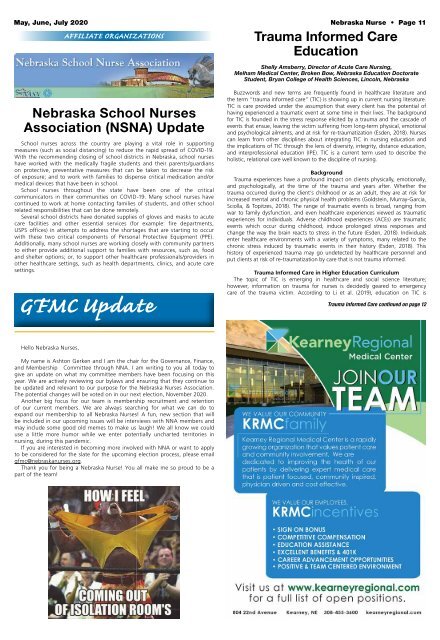Nebraska Nurse - May 2020
Create successful ePaper yourself
Turn your PDF publications into a flip-book with our unique Google optimized e-Paper software.
<strong>May</strong>, June, July <strong>2020</strong> <strong>Nebraska</strong> <strong>Nurse</strong> • Page 11<br />
AFFILIATE ORGANIZATIONS<br />
Trauma Informed Care<br />
Education<br />
Shelly Amsberry, Director of Acute Care Nursing,<br />
Melham Medical Center, Broken Bow, <strong>Nebraska</strong> Education Doctorate<br />
Student, Bryan College of Health Sciences, Lincoln, <strong>Nebraska</strong><br />
<strong>Nebraska</strong> School <strong>Nurse</strong>s<br />
Association (NSNA) Update<br />
School nurses across the country are playing a vital role in supporting<br />
measures (such as social distancing) to reduce the rapid spread of COVID-19.<br />
With the recommending closing of school districts in <strong>Nebraska</strong>, school nurses<br />
have worked with the medically fragile students and their parents/guardians<br />
on protective, preventative measures that can be taken to decrease the risk<br />
of exposure; and to work with families to dispense critical medication and/or<br />
medical devices that have been in school.<br />
School nurses throughout the state have been one of the critical<br />
communicators in their communities on COVID-19. Many school nurses have<br />
continued to work at home contacting families of students, and other school<br />
related responsibilities that can be done remotely.<br />
Several school districts have donated supplies of gloves and masks to acute<br />
care facilities and other essential services (for example: fire departments,<br />
USPS offices) in attempts to address the shortages that are starting to occur<br />
with these two critical components of Personal Protective Equipment (PPE).<br />
Additionally, many school nurses are working closely with community partners<br />
to either provide additional support to families with resources, such as, food<br />
and shelter options; or, to support other healthcare professionals/providers in<br />
other healthcare settings, such as health departments, clinics, and acute care<br />
settings.<br />
GFMC Update<br />
Buzzwords and new terms are frequently found in healthcare literature and<br />
the term “trauma informed care” (TIC) is showing up in current nursing literature.<br />
TIC is care provided under the assumption that every client has the potential of<br />
having experienced a traumatic event at some time in their lives. The background<br />
for TIC is founded in the stress response elicited by a trauma and the cascade of<br />
events that ensue, leaving the victim suffering from long-term physical, emotional<br />
and psychological ailments, and at risk for re-traumatization (Esden, 2018). <strong>Nurse</strong>s<br />
can learn from other disciplines about integrating TIC in nursing education and<br />
the implications of TIC through the lens of diversity, integrity, distance education,<br />
and interprofessional education (IPE). TIC is a current term used to describe the<br />
holistic, relational care well known to the discipline of nursing.<br />
Background<br />
Trauma experiences have a profound impact on clients physically, emotionally,<br />
and psychologically, at the time of the trauma and years after. Whether the<br />
trauma occurred during the client’s childhood or as an adult, they are at risk for<br />
increased mental and chronic physical health problems (Goldstein, Murray-Garcia,<br />
Sciolla, & Topitzes, 2018). The range of traumatic events is broad, ranging from<br />
war to family dysfunction, and even healthcare experiences viewed as traumatic<br />
experiences for individuals. Adverse childhood experiences (ACEs) are traumatic<br />
events which occur during childhood, induce prolonged stress responses and<br />
change the way the brain reacts to stress in the future (Esden, 2018). Individuals<br />
enter healthcare environments with a variety of symptoms, many related to the<br />
chronic stress induced by traumatic events in their history (Esden, 2018). This<br />
history of experienced trauma may go undetected by healthcare personnel and<br />
put clients at risk of re-traumatization by care that is not trauma informed.<br />
Trauma Informed Care in Higher Education Curriculum<br />
The topic of TIC is emerging in healthcare and social science literature;<br />
however, information on trauma for nurses is decidedly geared to emergency<br />
care of the trauma victim. According to Li et al. (2019), education on TIC is<br />
Trauma Informed Care continued on page 12<br />
Hello <strong>Nebraska</strong> <strong>Nurse</strong>s,<br />
My name is Ashton Gerken and I am the chair for the Governance, Finance,<br />
and Membership Committee through NNA. I am writing to you all today to<br />
give an update on what my committee members have been focusing on this<br />
year. We are actively reviewing our bylaws and ensuring that they continue to<br />
be updated and relevant to our purpose for the <strong>Nebraska</strong> <strong>Nurse</strong>s Association.<br />
The potential changes will be voted on in our next election, November <strong>2020</strong>.<br />
Another big focus for our team is membership recruitment and retention<br />
of our current members. We are always searching for what we can do to<br />
expand our membership to all <strong>Nebraska</strong> <strong>Nurse</strong>s! A fun, new section that will<br />
be included in our upcoming issues will be interviews with NNA members and<br />
may include some good old memes to make us laugh! We all know we could<br />
use a little more humor while we enter potentially uncharted territories in<br />
nursing, during this pandemic.<br />
If you are interested in becoming more involved with NNA or want to apply<br />
to be considered for the slate for the upcoming election process, please email<br />
gfmc@nebraskanurses.org.<br />
Thank you for being a <strong>Nebraska</strong> <strong>Nurse</strong>! You all make me so proud to be a<br />
part of the team!

















